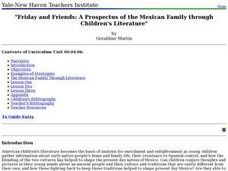Curated OER
Friday and Friends: A Prospectus of the Mexican Family through Children's Literature
Pupils use literature to examine how the structure of families in Mexico has changed over time. In groups, they examine how their life now relates to their ancestors and the Spanish conquest of the area. As a class, they are read...
Teaching Tolerance
Introducing 'The New Jim Crow'
When Jim Crow Laws ended, the intent behind them did not. Academics read "The New Jim Crow Laws" and an interview from the author to understand how racism has not ended, but rather changed over time. The lesson explains how prejudices in...
Teaching Tolerance
Slavery as a Form of Racialized Social Control
An engaging lesson delves into the effects of slavery on society. Young historians read text excerpts, complete handouts, and participate in group discussion to understand how slavery was a means to control society and establish a racial...
Teaching Tolerance
Racial Disparity in the Criminal Justice System
Explore the impact of the war on drugs in a thought-provoking lesson for high school academics. Young historians delve into the world of the criminal justice system and the racial disparity that occurs in the US. The resource provides...
Teaching Tolerance
Mass Incarceration as a Form of Racialized Social Control
Mass incarceration: A result of a tough stance on crime or racial discrimination, you decide. Academics explore the history and reasons behind mass incarcerations in the United States and its impact on ethnic communities. The...
Center for History Education
Japanese American Internment During World War II
World War II turned nations against each other and neighbors into enemies. An eye-opening lesson explores the dark past of Japanese-American internment camps during WWII. Scholars learn of the fear and distrust toward Asian Americans...
Curated OER
Ethnicity and Nationality
Students examine the psychological aspects of ethnicity and national identity. They read, discuss, and analyze two case studies, identify three factors that cause many national and ethnic conflicts, and write an essay.
Curated OER
Documents of Diversity
Eighth graders explore the cultural diversity present within their own families. They also look at the cultural makeup of their own community. They look closely at the works of art of three Canadian artists - all of whom emigrated to...
Curated OER
Concept Formation Lesson Plan: Understanding "Protest"
After analyzing both examples and non-examples of a variety of protests conducted by ethnic groups in Seattle and the state of Washington during the twentieth century, your class members will work to identify the key ideas and components...
Facing History and Ourselves
After Charlottesville: Public Memory and the Contested Meaning of Monuments
Are Civil War monuments a kind remembrance or a reminder of a dark past? The lesson plan focuses on the public's memory of the Civil War and the monuments that represent it. Young academics explore past efforts to change historical...
Museum of the American Revolution
People of the Revolution
It's nothing new—America has always been a melting pot of cultures. The resource explores the diversity of individuals living in the American colonies during the Revolutionary War. Scholars examine artifacts and primary sources to...
Facing History and Ourselves
Many Voices, One National Identity
To conclude the unit on "Exploring Identity in the United States," pupils consider whether it is possible to combine many voices into one national identity. After creating an identity chart that lists words, phrases, and images that they...
Curated OER
Race and Ethnicity in the United States
Students explore race and ethnicity as it is defined by the U. S. Census Bureau. They compare data from 1900, 1950, and 2000 and identify settlement patterns and changes in population. In groups, they map these changes and discuss...
Curated OER
Immigration and Settlement of Ethnic Groups in the Pacific Northwest
Students examine ethnic history of the Pacific Northwest in the period 1850-1950. They research documents and images in digital archives to explore immigration of various ethnic groups that settled in the region during this period.
Curated OER
Exploring Ethnic Groups in Africa
Students research the ethnic groups located in African countries where African Americans immigrated. They view a multi-media presentation imbedded in this plan, then construct posters that represent ethnic groups.
Curated OER
Ethnic Groups in World War II
Students discuss the contributions of various ethnic groups during World War II prior to visiting the George Bush Gallery of the Pacific War. After the visit, they interview veterans about prejudice during the war or listen to a guesst...
Curated OER
China's Ethnic Minorities
Third graders are introduced to various Chinese ethnic groups. They consider how geography affects ethnic groups and examine artifacts produced by Chinese peoples. They prepare a presentation of their research and artifact interpretation.
Curated OER
Origins of Ethnic Stereotypes
Young scholars continue their discussion of stereotypes. In groups, they brainstorm a list of ethnics living in the United States today and research their origins. They examine how the stereotypes began and why they are still prevalent...
Curated OER
Folk Groups and Community Folklife
Young scholars explore folk groups and traditions in their local community. In this folklife lesson plan, students list the folk groups they belong to and its traditions. Young scholars write about their favorite tradition and may...
Teaching Tolerance
Jim Crow as a Form of Racialized Social Control
Just because slavery was illegal doesn't mean it went away ... Jim Crow Laws took its place. An eye-opening lesson focuses on how Jim Crow Laws were used as a form of racial social control against African Americans in the United States....
PBS
Who Are Latinos?
What does it mean to be Latino? With an eye-opening lesson plan, pupils discover what it means to be Latino in the United States. They participate in classroom discussions, use graphic organizers, and watch a short video to help them...
Teaching Tolerance
Using Photographs to Teach Social Justice | Exposing Racism
Photographs capture a moment in time. And some of the best pictures demand that viewers not only ask questions about why the photo packs such an emotional wallop, but also about what happened before and after it was taken. A photograph...
Teaching Tolerance
Using Photographs to Teach Social Justice | Legal Action: The Supreme Court
A social justice lesson focuses on the Supreme Court case Loving v. Virginia which struck down laws that prohibited marriages between African Americans and white Americans. The lesson begins with class members examining a photograph of...
National Center for Case Study Teaching in Science
Bad Blood
When it comes to science and medicine, ethics should always be a primary consideration; unfortunately, that has not always been the case. There are countless examples throughout history of questionable medical practices, marginalized...
Other popular searches
- Caribbean Ethnic Groups
- Chinese Ethnic Groups
- African Ethnic Groups
- Ethnic Groups Central Africa
- Ethnic Groups of Texas
- Perception of Ethnic Groups
- Ethnic Groups in China
- Ethnic Groups Middle East
- Bolivia Ethnic Groups
- Ethnic Groups Wwii
- China's Ethnic Groups
- Nigerian Ethnic Groups

























